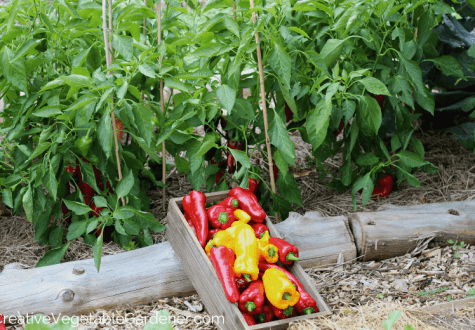Best Fertilizers for Peppers: Increase Growth and Taste Naturally
Best Fertilizers for Peppers: Increase Growth and Taste Naturally
Blog Article
Organic Vs. Synthetic Fertilizers: Which Is Best for Nurturing Healthy And Balanced Pepper Plants?
In the realm of supporting healthy and balanced pepper plants, the selection between artificial and natural plant foods stands as a crucial decision with far-ranging ramifications. While both alternatives purpose to supply vital nutrients to sustain plant development, the subtleties of their effect on the soil, plant wellness, and the environment trigger an argument that echoes throughout the horticulture neighborhood. Comprehending the distinct advantages and prospective risks of each plant food type is vital for pepper farmers seeking to maximize their returns while keeping a sustainable and eco-conscious method.
Benefits of Organic Plant Foods
Organic fertilizers provide a sustainable and environmentally-friendly technique to beneficial pepper plants, offering necessary nutrients without making use of artificial chemicals. These natural plant foods are originated from organic sources such as garden compost, manure, bone dish, and algae, promoting soil health and wellness and biodiversity. Unlike artificial plant foods, organic alternatives release nutrients gradually, making sure a balanced and constant supply for pepper plants to thrive.
One significant advantage of natural plant foods is their capacity to boost soil framework and water retention. By boosting dirt health and wellness, natural fertilizers advertise valuable microbial activity, which aids in nutrient uptake by pepper plants. Furthermore, natural fertilizers reduce the danger of chemical run-off, securing water resources from air pollution and safeguarding the atmosphere.
In addition, natural plant foods add to lasting dirt fertility by promoting the growth of helpful dirt organisms. These organisms aid damage down raw material, launching nutrients in a form that is easily accessible to pepper plants. best fertilizers for peppers. By cultivating a healthy dirt environment, organic fertilizers sustain lasting pepper growing practices that profit both plants and the environment
Downsides of Synthetic Fertilizers
Synthetic fertilizers, in comparison to their organic counterparts, posture various downsides when made use of to nurture pepper plants, affecting both plant wellness and ecological sustainability. One major downside of synthetic plant foods is their tendency to leach nutrients from the soil promptly. This rapid leaching can result in nutrition inequalities in the soil, causing plants to struggle with shortages or toxicities. Furthermore, artificial plant foods can hurt useful dirt organisms, such as earthworms and beneficial microorganisms, interrupting the soil ecological community's equilibrium.
Additionally, the overuse of artificial plant foods can add to water contamination. Excess fertilizers not soaked up by plants can get rid of into water bodies, resulting in eutrophication, where algae blossoms deplete oxygen levels in the water, hurting marine life. Synthetic fertilizers are generally obtained from non-renewable resources, such as fossil gas, adding to carbon emissions and ecological destruction throughout their manufacturing.
Nutrient Absorption Contrast
When contrasting natural and artificial fertilizers in terms of nutrient absorption, organic plant foods have the benefit of providing a much more well balanced and slow-release resource of nutrients. Organic fertilizers have a variety of macro and trace elements that are not only useful for the plants but also promote healthy dirt microbial activity, which helps in nutrient uptake.
Furthermore, natural plant foods enhance dirt framework and water retention capability, allowing pepper plants to gain access to nutrients a lot more effectively. This better dirt quality assists in origin growth, making it possible for far better nutrient absorption. Synthetic fertilizers, although at first increasing plant growth as a result of their high nutrient focus, may prevent lasting nutrient absorption by degrading soil health and wellness with time.
Ecological Influence Considerations

On the other hand, synthetic plant foods, although usually more concentrated and quickly offered to plants, can have detrimental effects on the atmosphere if not used effectively (best fertilizers for peppers). Their production calls for high power inputs, bring about greenhouse gas great post to read discharges and adding to climate adjustment. The drainage of excess artificial plant foods can infect water sources, leading to eutrophication and harming water ecological communities.
Ideal Plant Food Practices for Peppers
When fertilizing pepper plants, optimizing nutrient uptake and reducing ecological effect are essential factors to consider. To achieve this, it is important to adhere to best plant food practices tailored to the certain requirements of pepper plants. One critical practice is to perform a soil test prior to using any type of plant foods. This test can figure out the pH level of the soil and recognize any type of nutrient deficiencies, directing you in choosing one of the most appropriate fertilizer formula.
Another important practice is to fertilize pepper plants at the correct time. Usually, peppers benefit from getting plant food at growing and afterwards once again when they begin to blossom. Over-fertilizing can result in vitamins and mineral inequalities and hurt the plants, so it is vital to follow advised application prices.
Furthermore, selecting a balanced plant food with an NPK ratio that matches pepper plants' needs webpage is basic. Inevitably, incorporating artificial and natural plant foods sensibly can help support healthy and balanced pepper plants while decreasing ecological impact.
Verdict

Organic fertilizers provide a lasting and environmentally-friendly technique to nourishing pepper plants, supplying essential nutrients without the use of artificial chemicals. Unlike artificial fertilizers, organic options launch nutrients slowly, guaranteeing a constant and well balanced supply for pepper plants to grow.
Synthetic fertilizers, in contrast to their natural equivalents, posture different downsides when made use of to nurture pepper plants, influencing both plant health and environmental sustainability. When read this comparing artificial and organic fertilizers in terms of nutrient absorption, organic fertilizers have the benefit of giving an extra balanced and slow-release resource of nutrients.Additionally, organic fertilizers boost soil framework and water retention capacity, enabling pepper plants to access nutrients much more effectively.
Report this page